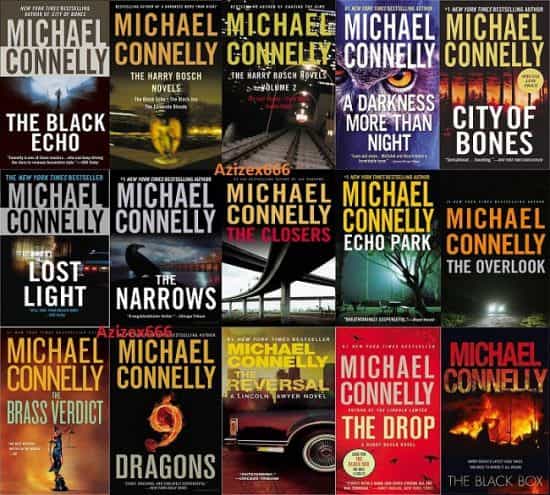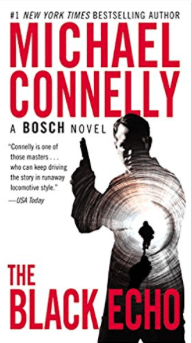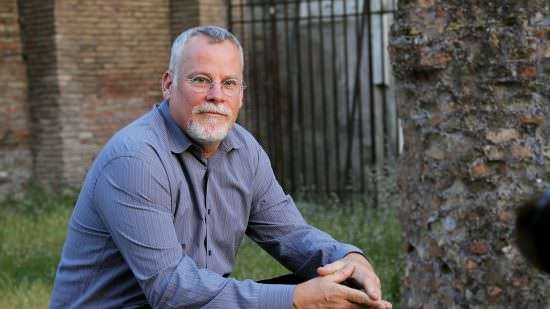by Michael Connelly
 Michael Connelly is best known for his Harry Bosh detective novels and his Lincoln Lawyer series. He has also written several stand alone novels, produced television shows based on his work, appeared as himself in television dramas and Clint Eastwood even turned one of his novels into a movie!
Michael Connelly is best known for his Harry Bosh detective novels and his Lincoln Lawyer series. He has also written several stand alone novels, produced television shows based on his work, appeared as himself in television dramas and Clint Eastwood even turned one of his novels into a movie!
“I took a long way through college,” says Connelly. Had he not, the world may have never discovered one of the best detective novelists of our time. He took an 18-month hiatus from his college studies at the University of Florida in Gainesville, where he struggled with the construction engineering curriculum. “It was the family line. I like that work.”
During his hiatus he wrestled with what he wanted to do. “I bummed around and worked menial jobs that instilled in me the desire to return to college,” he says. “One thing that was cool was that my parents—who were upset with my initial college performance—made me get my little sisters up and ready for school each day. Then I had to drive them to school. It was a method of making sure I didn’t go out late every night because I had to get up so early. But more importantly I got very close to my sisters who previously, because of our age difference—eight and 10 years—I barely knew.”
That’s also about the time Raymond Chandler entered his life. On dollar movie night at the student union, he watched Robert Altman’s film, “The Long Goodbye,” based on Chandler’s novel and instantly became a fan. He read all of Chandlers books in just a few weeks and it changed his life. “With his books I saw the next degree of artistry and that really affected me. That’s where I got the desire to not just read these types of books, I wanted to write them.”
“You might want to supplement that if you can’t make a living at it,” his dad advised. So, Connelly says, “we hit upon the idea that to get into the world of crime I needed to be a lawyer, a cop or a reporter.” The reporter’s role, obviously, seemed ideal. It would immerse him in the midst of his chosen pursuit while allowing him to hone his craft. Or so he hoped.
“What I didn’t realize,” he says, is that journalism, “would give you a great work ethic.” So he changed his plans, majored in journalism and minored in creative writing. “I wasn’t writing a lot of fiction at all, even though that was my goal.” But he was writing. Always writing.
After graduation in 1980 he moved to Daytona Beach and started as a police reporter at the small newspaper, the Daytona Beach News Journal. It was a new city to him where he knew no one. And to make matters worse, his girlfriend, Linda, lived two and a half hours away, limiting their time together to weekends. So with he took full advantage of down time. “I started at night with a typewriter writing fiction.”
Nearly two years later he moved south to the larger Fort Lauderdale News and Sun-Sentinel, where he spent six years covering Florida’s drug wars and honing his craft. During that time, he wrote two private eye novels based on stories from his youth working at several beachfront hotels. Many of the staff he worked with were young runaways and he used their stories as their basis. Still, he knew his manuscripts weren’t good enough and he struggled to figure out what was missing. What he later came to realize was the writing axiom that made his Harry Bosch detective series a huge success. “You get into a situation where plot is king and you really should know character is king.”
He never submitted them. “It was part of the learning process,” he says. He soon became a feature writer for the newspaper’s Sunday magazine, Sunshine, which gave more latitude to his non-fiction writing. His press card, he says, “gave me an unfair advantage. It gave me entrée into writing fiction.” He had a front row seat to the underworld and how the police struggled daily to keep the lid on crime and on their own lives.
“I still remember sitting across the desk from a female detective calling her daughter and telling her she can’t come home because she was investigating a case. I began to see the humanity.” This helped him slowly give birth to his future fictional characters. He worked homicide cases with a squad of six detectives. “That was one of the luckiest breaks I ever had,” he says. And yet, he admits, “I went through about a year where I did not write any fiction. I concentrated on magazine stories and credible clips. I was really missing it.”
 Then, working with two other reporters at the paper, he wrote the human story of the 1985 crash of Delta Airlines Flight 191, which originated in Fort Lauderdale and crashed in bad weather on approach to Dallas-Fort Worth International. A year later Connelly interviewed Gilbert Greene, a Florida State University college student who walked away from the tragedy with no visible scares. Like many of the Flight 191 survivors, Greene struggled with survivor’s guilt and told Connelly, “Nobody walks away.” The story affected Connelly more than any other he had ever written as a journalist.
Then, working with two other reporters at the paper, he wrote the human story of the 1985 crash of Delta Airlines Flight 191, which originated in Fort Lauderdale and crashed in bad weather on approach to Dallas-Fort Worth International. A year later Connelly interviewed Gilbert Greene, a Florida State University college student who walked away from the tragedy with no visible scares. Like many of the Flight 191 survivors, Greene struggled with survivor’s guilt and told Connelly, “Nobody walks away.” The story affected Connelly more than any other he had ever written as a journalist.
It was reprinted around the country, won numerous awards and made him a finalist for the Pulitzer Prize; and that immediately earned him a job offer from The Los Angeles Times. “I’d never been to LA before.” By then, he had married his girlfriend, Linda McCaleb, and together they moved across country to the City of Angels, the home of his inspiration, Raymond Chandler.
“Finally when I got to LA I positioned myself the way I wanted to. So there was no reason to wait.” He began to write fiction, even as he worked long days as a police reporter. He remembers sitting in one detective briefing about a bank heist, watching the investigators and how they dealt with the information and interacted. “I had to wed it to the lesson I had learned (back in Florida) that it was all about character.”
For the next three years, he toiled in the stress-laden world of detectives, cops and crime—absorbing all he could and honing his writing skills. Yet one Times editor told him his writing wasn’t good enough and he would never make it from his suburban bureau to the newspaper’s main newsroom in downtown Los Angeles. That inspired him to work even harder.
“I did a lot of shoe leather. I talked to about 100 detectives a week. In the initial year I was trying to get inside police stations, inside detective stations. When I did that, they would leave an impression. I would get to know some and observe things about others and a lot of those were used in building a character known as Harry Bosch.”
“I think because of journalism, because you write every day and you have that kind of ethic and I was over 30 and my wife wanted to start a family, I felt an urgency…I was going to take one more swing at this—you know, three times and you’re out.”
So he hit the precincts by day covering criminal investigations and drove himself to write his fictional version four evenings a week sitting at his home computer. He completed his novel, Black Echo, in two years—the longest he has ever taken from start to finish on a manuscript. Today, he completes a novel in about a year.
It was a time before the Internet, so he purchased Writers Digest Guide to Literary Agents and then embarked on his search for an agent. “Like everyone else, I got a copy of that. I struck upon this plan. I would look up the agents of writers I admired and hoped I was emulating.” He created a list of 10 agents of writers whose work he loved and ranked them. “I called Lawrence Block’s publisher. ‘Can I have his editor’ I asked. I got transferred to the editor’s secretary. I told her I wanted to send something to Lawrence Block.”
The secretaries all gave him a name. He’d look up the agent’s address and send off a hard copy of his manuscript along with his query letter. “I sent them each a letter that exaggerated my skills.” It was 1990. He mailed his manuscript and then did what writers do: he waited. Four agents soon rejected it and at the end of eight months he still had no nibbles.
Saturday in the Connelly household was the day when Linda usually talked to her mother back in Florida. But on this Saturday, Linda was running errands when the phone rang. Thinking the call wasn’t for him, but was his mother-in-law on the line for his wife, he let it ring. From across the room, he heard Phil Spitzer, James Lee Burke’s literary agent, leave a message that he wanted to speak with him. Connelly was stunned, kicking himself for not grabbing the phone sooner. “I’m sitting there listening to it. I thought it would be rude to answer: ‘Here it’s me! It’s me!’ so I waited 15 minutes and called back and he took the book.”
 The two did not meet until after Spitzer sold Black Echo. Connelly ventured from Los Angeles to New York City to find Spitzer’s office on 11th Street in Hell’s Kitchen. Having read Spitzer subsidized his agent’s income as a cab driver, he was suspicious he was being set up. “I think generally I’ve been paranoid about stuff—the story behind the story. I think that might have been amplified because I was a reporter,” Connelly says.
The two did not meet until after Spitzer sold Black Echo. Connelly ventured from Los Angeles to New York City to find Spitzer’s office on 11th Street in Hell’s Kitchen. Having read Spitzer subsidized his agent’s income as a cab driver, he was suspicious he was being set up. “I think generally I’ve been paranoid about stuff—the story behind the story. I think that might have been amplified because I was a reporter,” Connelly says.
But after their initial meeting, Connelly quickly felt at ease with his new agent. Spitzer told him he “was sure he could sell” Black Echo. He wanted to get James Lee Burke’s editor to buy it. Spitzer sent it to three publishers.
One of the first editors Spitzer contacted loved the book, but she passed on it because her bosses were at the annual Frankfurt Book Fair and she didn’t want to wait. An editor at another publishing house also turned it down. Spitzer describe him as having “a snotty attitude” and cites his rejection letter: “This is a pretty good story but the writing is not elevated enough for our list.” Spitzer has the letter to this day. “I look back at that and I say, fuck you!” The publisher, he says, “has not done anything as near as good as Michael…He is one of a kind. It is impossible to compare him to anybody.”
Little Brown and Company quickly picked it up.
“You have James Lee Burke’s editor who wants to publish your book at Little Brown,” Spitzer told Michael. “We can keep going…if you want to make more money…let me see if we can get a bidding war going.” Connelly said no.
“He was pleased with the offer and it was just enough to change his thoughts on the future,” says Spitzer. “It was a decent enough deal to make a living on his books.”
It took more than a decade of struggling to hone his craft—absorbing everything he could about criminal investigations—and years of closely observing human interaction to prepare to write his novel. Yet the time between Spitzer’s almost-missed telephone call on a Saturday morning and Little Brown and Company picking up Black Echo, was publishing warp speed—just three months.
Finally, in 1992 Little Brown and Company printed 15,000 copies of his book and sold 12,000. In all, from the realization he wanted to be a novelist to becoming a published fiction writer took Connelly 15 years.
“The book was successful, but not in terms of me being an overnight sensation,” he says. So Michael kept his day job. Only after publication of his fourth novel, The Last Coyote, did he feel secure enough in his potential that he finally left the newspaper to devote his full attention to writing crime fiction.
But, says Spitzer, “The thing that changed it was when he wrote The Poet. It was the first one that was not a Harry Bosch book. I’ve followed waves come and go. The one thing that stays constant is that writers who sell a series—the next book sells a few thousand copies more. Often the book doesn’t take a great leap until the author writes a stand alone…it put Michael at a whole different level.”
It was his first New York Times bestseller when it came out in paperback.
Michael’s dad was right. The odds were long, but he had overcome them and no longer needed a backup plan.

Black Echo, Michael Connelly
Start to Finish: 15 Years
I want to be a writer: Age 21
Decided to write a novel: 1984
Experience: Award winning police reporter. Pulitzer Prize finalist.
Writing Time: 2 years
Agents Contacted: 10
Agent Rejections: 4
Agent Submission: 1990
Time to Sell Novel: 3 Months
First Published Novel: 1992
First Novel Agent: Philip Spitzer. (James Lee Burke’s agent.)
First Novel Editor: Patricia Mulcahy (James Lee Burke’s editor) bought it but then switched publishers. Michael Pietsch completed it.
First Novel Publisher: Little Brown and Company (rejected by Knopf)
Inspiration: Raymond Chandler
Website: MichaelConnelly.com
Advice to Writers: “The reading public is highly educated. Infuse your book with accuracy. Be genuine.”




